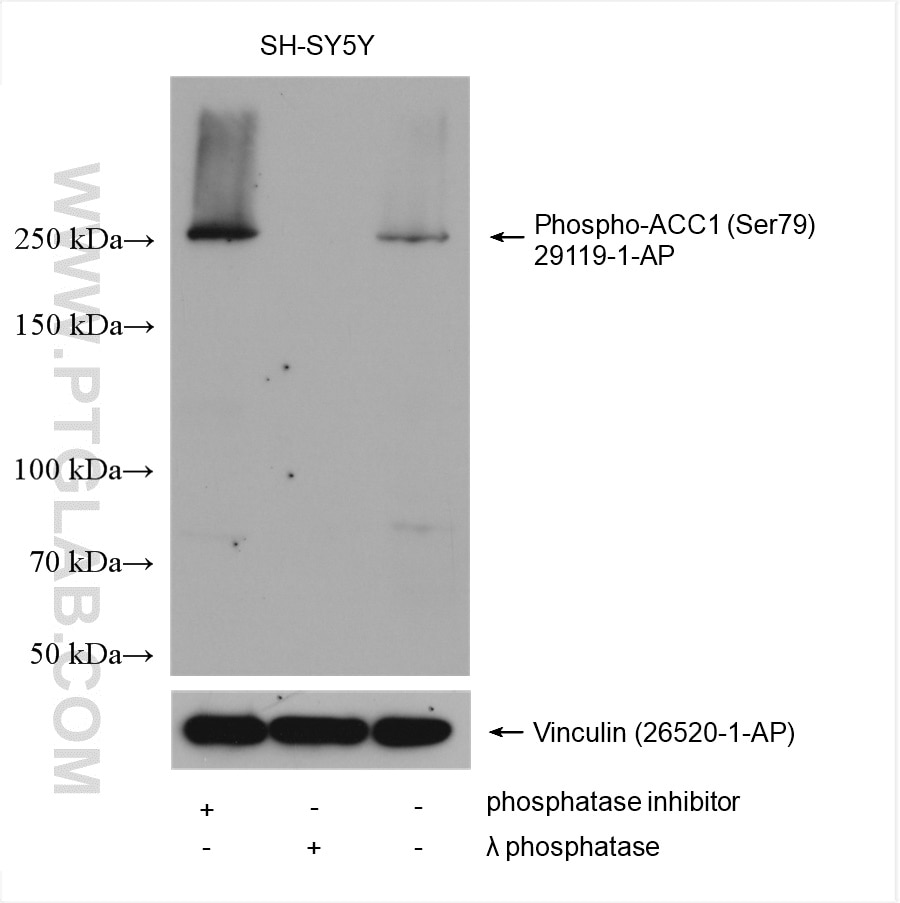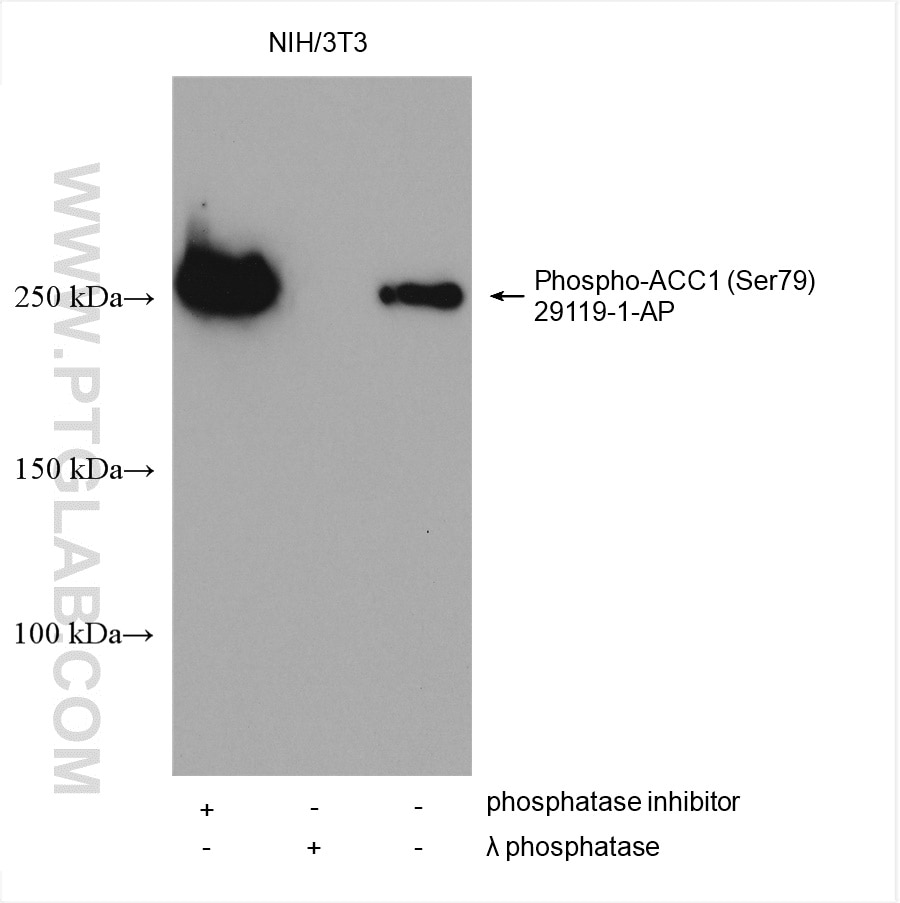Phospho-ACC1 (Ser79) Polyklonaler Antikörper
Phospho-ACC1 (Ser79) Polyklonal Antikörper für WB, ELISA
Wirt / Isotyp
Kaninchen / IgG
Getestete Reaktivität
human, Maus, Ratte
Anwendung
WB, IHC, ELISA
Konjugation
Unkonjugiert
Kat-Nr. : 29119-1-AP
Synonyme
Geprüfte Anwendungen
| Erfolgreiche Detektion in WB | Mit λ-Phosphatase behandelte SH-SY5Y-Zellen, Mit λ-Phosphatase behandelte NIH/3T3-Zellen |
Empfohlene Verdünnung
| Anwendung | Verdünnung |
|---|---|
| Western Blot (WB) | WB : 1:500-1:2000 |
| It is recommended that this reagent should be titrated in each testing system to obtain optimal results. | |
| Sample-dependent, check data in validation data gallery | |
Veröffentlichte Anwendungen
| WB | See 24 publications below |
| IHC | See 2 publications below |
Produktinformation
29119-1-AP bindet in WB, IHC, ELISA Phospho-ACC1 (Ser79) und zeigt Reaktivität mit human, Maus, Ratten
| Getestete Reaktivität | human, Maus, Ratte |
| In Publikationen genannte Reaktivität | human, Maus, Ratte |
| Wirt / Isotyp | Kaninchen / IgG |
| Klonalität | Polyklonal |
| Typ | Antikörper |
| Immunogen | Peptid |
| Vollständiger Name | acetyl-Coenzyme A carboxylase alpha |
| Berechnetes Molekulargewicht | 2383 aa, 275 kDa |
| Beobachtetes Molekulargewicht | 250 kDa |
| GenBank-Zugangsnummer | BC137287 |
| Gene symbol | Acetyl-CoA Carboxylase 1 |
| Gene ID (NCBI) | 31 |
| Konjugation | Unkonjugiert |
| Form | Liquid |
| Reinigungsmethode | Antigen-Affinitätsreinigung |
| Lagerungspuffer | PBS with 0.02% sodium azide and 50% glycerol |
| Lagerungsbedingungen | Bei -20°C lagern. Nach dem Versand ein Jahr lang stabil Aliquotieren ist bei -20oC Lagerung nicht notwendig. 20ul Größen enthalten 0,1% BSA. |
Hintergrundinformationen
ACC1 represents a key enzyme, as it is highly regulated by phosphorylation and allosteric regulation, providing a rapid adaptation to new micro-environmental conditions. AMPK phosphorylates acetyl CoA carboxylase (ACC), a rate-controlling step in the conversion of acetyl-CoA to malonyl CoA. This phosphorylation inhibits the activity of ACC, which results in decreased malonyl CoA levels. Additionally, two isoforms of ACC encoded by two different genes in mammalian cells have been described, ACC1 and ACC2. ACC1 is highly enriched in lipogenic tissues (liver and adipose), while ACC2 is mainly expressed in oxidative tissues (heart, skeletal muscle and liver). (PMID: 29056512, PMID: 16054041, PMID: 30816537)
Protokolle
| PRODUKTSPEZIFISCHE PROTOKOLLE | |
|---|---|
| WB protocol for Phospho-ACC1 (Ser79) antibody 29119-1-AP | Protokoll herunterladen |
| STANDARD-PROTOKOLLE | |
|---|---|
| Klicken Sie hier, um unsere Standardprotokolle anzuzeigen |
Publikationen
| Species | Application | Title |
|---|---|---|
Signal Transduct Target Ther The AKAP12-PKA axis regulates lipid homeostasis during alcohol-associated liver disease | ||
Autophagy Periplocin suppresses the growth of colorectal cancer cells by triggering LGALS3 (galectin 3)-mediated lysophagy | ||
Free Radic Biol Med The opposite role of lactate dehydrogenase a (LDHA) in cervical cancer under energy stress conditions | ||
J Ethnopharmacol Ferulic acid from Angelica sinensis (Oliv.) Diels ameliorates lipid metabolism in alcoholic liver disease via AMPK/ACC and PI3K/AKT pathways | ||
Food Funct Hawk tea prevents high-fat diet-induced obesity in mice by activating the AMPK/ACC/SREBP1c signaling pathways and regulating the gut microbiota. | ||
Front Cardiovasc Med MCC950, a Selective NLRP3 Inhibitor, Attenuates Adverse Cardiac Remodeling Following Heart Failure Through Improving the Cardiometabolic Dysfunction in Obese Mice. |



